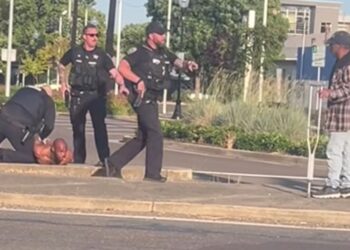The tragic end to Joshua Keith Beasley Jr.’s life on March 24, 2023, in an adult Texas prison facility speaks volumes about the ineptitude of the nation’s penal system and the conservative ideological politics of its judicial system in dealing with juvenile offenders.
An April 28, 2023, Texas Tribune article written by Lisa Armstrong tells not only how but why the 16-year-old died in an adult prison.
In 2018, at age 11, Beasley kicked a school safety officer. He was placed in a juvenile detention facility. Over the next four years, the troubled child (as he was under Texas law) repeatedly self-injured himself, including more than 50 times trying to take his own life.
Last year Beasley spit on and hit a juvenile staff member. That earned him five additional years in the Texas adult penal system.
Despite repeated pleas from his mother, the state transferred the 16-year-old out of juvenile detention custody into adult penal custody.
Six months later to the day he was found dead by suicide according to prison officials.
Beasley’s mother accused the State of Texas of killing her son.
That may be.
But the real institutional entity that killed Beasley is the ideological-driven U.S. Supreme Court.
The last 15 years of decision-making has convinced a majority of the American public that political ideology more often than not has subverted the Rule of Law in the high court.
That reality is evidenced by the way the Court has dealt with juvenile justice cases since 2005.
By 2005, twenty-two people were executed in the United States that were tried as adults after committing crimes when they were juveniles.
At the time, only two countries in the world, the US and Iran allowed the death penalty for juveniles.
In 2005, 22 American states, including Texas, allowed for the executions of juveniles.
In fact, Texas by far led the nation in killing juveniles with 13 such executions. Its nearest competitor, Virginia carried out three juvenile executions.
Juvenile executions came to a halt in 2005 when the Supreme Court in Roper v. Simmons held that executing a child whose crime was committed when they were under age 18 violated the cruel and unusual punishment provisions of the 8th Amendment and the due process provisions of the 14th Amendment.
Roper was decided by a 5-4 vote—four liberal justices and one moderate justice casting the deciding votes over the four conservative justices.
The views expressed by the dissenting opinions, led by Justice Antonin Scalia, reflected the political ideology of the justices about the death penalty more than their views about the Rule of Law.
Five years after Roper, the Supreme Court handed down another juvenile justice decision, Graham v. Florida, which held that juvenile offenders could not be sentenced to life without parole for non-homicide offenses; that such a punishment was disproportionate to the convicted offenses in violation of the 8th Amendment.
Once again, four liberal justices and one moderate justice cast the deciding votes over four conservative justices.
And, once again, the views expressed by the dissenting justices, led by Justices Clarence Thomas and Justice Scalia, reflected their political ideology over the Rule of Law.
Two years after Graham, the Supreme Court decided yet another juvenile justice case, Miller v. Alabama, which held that sentencing juvenile offenders to a mandatory life without parole sentence for homicide offenses also violated the cruel and unusual punishment provisions of the 8th Amendment.
Again, four liberal justices and one moderate justice cast the deciding votes over four conservative justices.
Although the dissenting justices, led by Chief Justice John Roberts, attempted to analyze the case from a constitutional perspective, the dissent still boiled down to an ideological perspective of how a society should punish its juveniles.
Four years after Miller (2016), the Supreme Court continued its efforts to define juvenile justice in America in Montgomery v. Louisiana—a decision that effectively held that its Miller decision had to be applied retroactively to those juveniles sentenced to mandatory life without parole before Miller.
The Montgomery decision was significant because the four liberal and one moderate justice were joined by one conservative justice (Chief Justice Roberts) over the remaining three conservative justices
In the wake of Miller and Montgomery—both of which greatly restricted mandatory life without parole sentences for juveniles tried as adults in homicide cases—states adopted a wide array of resentencing options, including life without parole for the most heinous juvenile murder cases after a factual determination was made that the offender was “permanently incorrigible.”
This penal confusion was created by the fact that neither Miller nor Montgomery established a “categorical ban on the practices of imposing life imprisonment without parole for juveniles.”
Instead the two decisions required an “individualized sentencing determination to identify those rare instances when a life without parole sentence would be appropriate.”
Some courts, wishing to avoid future challenges of life without parole sentences, opted to impose what are known as “virtual life sentences”—sentences with a specific number of years that must be served without the benefit of parole that exceed the life expectancy of the offender.
Constitutional Blessing
These new types of juvenile life without parole sentences were effectively given constitutional blessing in 2021 when the Supreme Court decided Jones v. Mississippi—a decision that held courts need not make an independent factual finding of “permanent incorrigibility” as a prerequisite to imposing a life without parole sentence on a juvenile offender.
The Jones decision was decided by six conservative justices, led by Justice Brett Kavanaugh, over the three liberal justices who voted in favor of Miller and Montgomery.
The Jones decision effectively gutted the Miller prohibition that, as a matter of constitutional principle, life without parole sentences should not be imposed on juvenile offenders—a decision that now personifies the ideological conservative views of the current Supreme Court.
The defendant in the Jones case, Brett Jones, was 15 years old in 2004 when he stabbed his grandfather to death during a household fistfight started by the grandfather who was angry because Jones had let his teenage girlfriend spend the night in his bedroom at the grandfather’s house.
This was not a premeditated murder. It was a killing that occurred after a family fistfight escalated into a stabbing death.
It was certainly not the kind of “rare” instance envisioned by the Miller Court that would warrant a mandatory life without parole sentence for a juvenile offender as “appropriate” for the offense committed.
In the wake of Jones, States can enact pretty much any juvenile sentencing regime as long as the sentencing court considers the offender’s youth and any attendant circumstances surrounding that youth and the offense.
Rather than deliver constitutional certainty, the Jones Court simply created more judicial confusion leaving politically conservative states to take more hard-lined measures in the delivery of juvenile justice while liberal states adopt more humane measures.
For example, Brett Jones would not have received a life without parole sentence in California yet in Mississippi that is not only the “appropriate” but the mandatory penalty.
This Did Not Have To Happen
In Texas, for example, a juvenile tried in adult court faces the same penalties as an adult, except for the death penalty and mandatory life without parole. Texas follows what it calls a “14-year-old rule”—the minimum age that a juvenile can be tried as an adult in the state while the minimum age in Kentucky is 10 years of age.
Texas, however, has a sordid history of fast-tracking juveniles from juvenile to adult courts for capital offenses, some drug offenses and certain felonies if the offender, particularly those of color, has extended criminal histories and is charged with a serious violent offense.
The judge did not have to send Joshua Beasley to an adult penal facility, but he did. Beasley is now dead because of it.
This tragedy is not confined to Texas.
Other states, like Florida (which leads the nation in sending juveniles to adult prisons), pack juveniles into adult prisons like “sardines in a can,” full well knowing that the practice will subsidize its prison industrial complex sustained through modern day slavery practices because a disproportionate number of these juveniles are Black.
This is the inhumane penal practice Jones v. Mississippi gave a constitutional blessing to—a practice that cost Joshua Beasley his life.



























